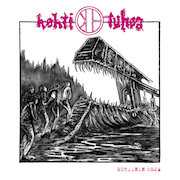There is an irresistible feeling of dumbassery I meet when writing about music sung in a language that I don’t understand. Particularly in the case of a genre like hardcore punk, where songs feel so imperative as vehicles for lyrically-expressed tenets. On this note, let’s proceed, all the while reducing the debut album of southern Finnish D-beat band Kohti Tuhoa to a mostly sonic experience. Let it be known that – as a small gesture – titles have been translated with 100% precision (Google Translate) and from the look of things, we can assume that Kohti Tuhoa (“from destruction”)’s Rutiinin Orja (“slave to routine”) is of the anomic, “everything sucks” disposition of its hardcore ancestors past.
Fortuitously, the vocals on this album are a remarkable detail: even sat within a genre demarcated by vitriol-spraying growls and shouts, the noises made by Helena Hiltunen are chilling. Perhaps because, often, these shouts bear some grounding in reality: it’s gruff, it’s populist, it’s “angry young men” and yet Hiltunen opts instead to transmogrify into something genderless, creature-like, something not executed with the empty pageantry of Discharge circa Grave New World. Reverb-laden and high-pitched, her screech tears through opener ‘Massakuolema’ (“mass death”) with an emotional intensity that not only feels authentic but also acts in the immediate suspension of disbelief.
It’s the hellish tone of those vocals defines the soundscape of Rutiinin Orja. While fundamentally a pogo-ing relative of Framtid, Rattus circa Uskonto on Vaara, Ruidosa Inmundicia, and Los Crudos, the album’s nightmarish mood is marked by glints of metal. It inhabits a slightly vast space, one where the occasional reverb or feedback can peter out, a processional drumbeat can arrhythmically break formation in a flourish; a tempo zig-zags; a shrill guitar riff spools out at the wrong time. Originally, the idea had been to make Sacrilege-esque material and though the resemblance is somewhat lost on listen alone, the concept remains: hardcore punk’s crossover to metal (for Kohti Tuhoa, it’s just inflections) plus frontwoman plus political indictments.
Their Finnish sociopolitical landscape is the perfect terrain for harvesting rage against the machine – amid a lacklustre economy, high unemployment, pay cuts, education cuts, there’s the looming menace of Putin at their peripheries, and it doesn’t hurt that the prime minister is an ex-business executive who made millions in telecoms. It follows on that Finnish punk and hardcore is prolific: in the current scene, there might be three punk shows on a Wednesday night in Helsinki alone.
Motivated from a lefty stance, Rutiinin Orja builds on the band’s EP of the same name released last year, placing six new tracks at the end of its CD variant. This is deployed without a sense of conceptualisation. The chronology of tracks feels random, but it’s a detail that is unimportant within a sound so enmeshed in chaos; if anything, it dramatises their zeitgeist. It is however missing anthemic refrains, a kind of positive velocity, and with it, that rousing and productive spirit connected to hardcore’s original purpose in activism. The chaos is exacerbated by the frenzied intensity at which instruments are played, fighting one another at a level whereby everything devolves into a blur of limbs. Like a bruise, it feels at times swollen, puffy, un-fun.
But actuated within such a short time frame, things happen too quickly for novelty to be lost. 16 songs teem down in under 30 minutes, between them packaging just one complete idea. It is a single-serving album, ready to be lifted from its shelf and unwrapped only at its specific call to action. But perhaps this is my cynicism speaking, having become acquainted with Kohti Tuhoa’s album at hours like 9am and at varying states of tiredness wherein I wished, in all honesty, instead to be aurally cradled by the gentle stylings of Elliott Smith.
Some listens later and at a time more fitting of its mood, finally, we’re clicking. One emotional and sonic battering later, I’m expelled; I emerge, I revive, really, really achey, exhilarated, asking, what the fuck just happened?


